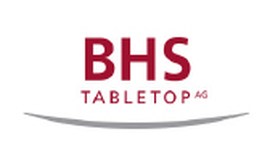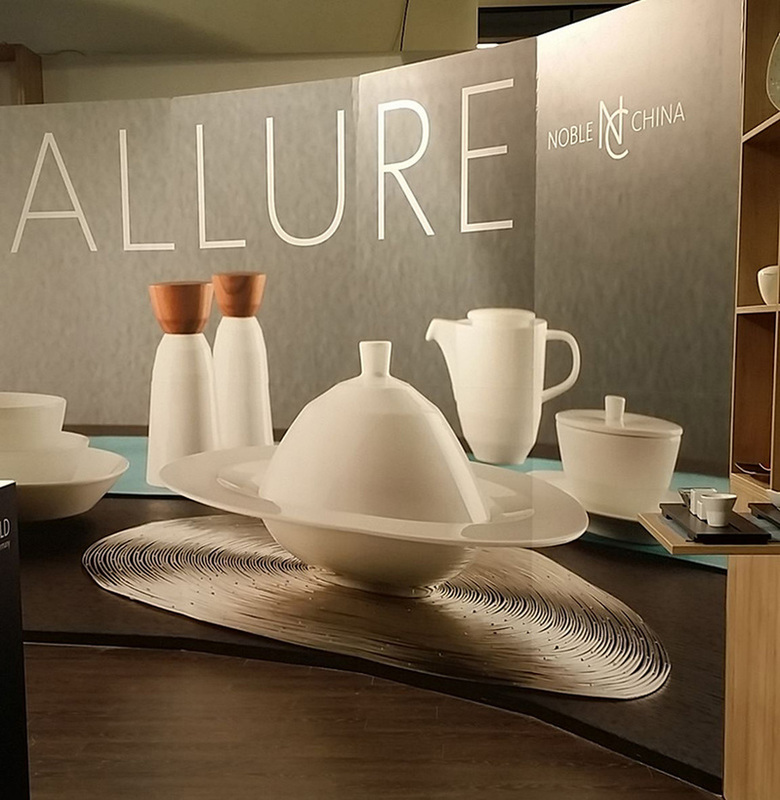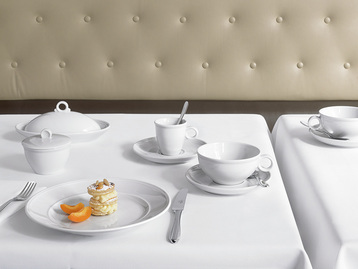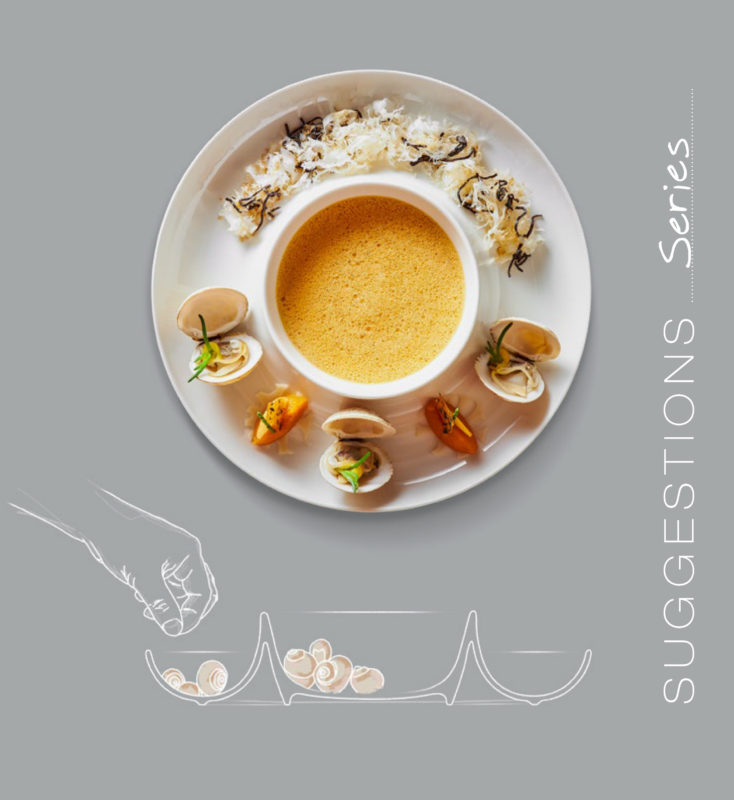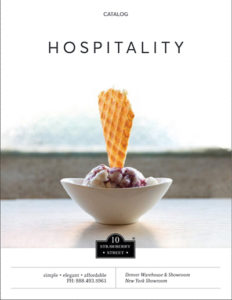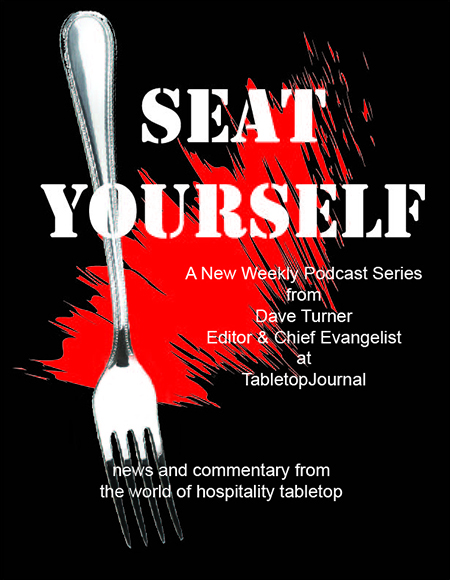When more than 200 million people dine out on your dinnerware every day, you must be doing something right. Germany’s BHS Tabletop and its extensive portfolio of brands and tabletop options command respect throughout the hospitality world. With a unique and different brand strategy than most, BHS Tabletop also has the unique position of having both historic, legacy brands such as Bauscher, Schonwald.… and a fresh, new creative brand like Tafelstern. This flexible, nimble approach that goes beyond simple branding and products. It extends also to their global distribution strategy that takes the company into hospitality concepts of all types from factory canteens to hotel banquets and white tablecloth restaurants all around the world.
BHS Tabletop CEO Christian Strootmann
We recently caught up with BHS Tabletop CEO Christian Strootmann to find out a little more about his background and what makes him tick, his company ….and, of course, how he views the world of hospitality tabletop.
TabletopJournal: To achieve success within the hospitality tabletop industry requires a wide variety of personal skills and experience. Can you tell us a little of your background and the preparation you had before becoming the leader of one of the world’s leading tabletop companies?
Christian Strootmann: My professional development took place in the fast moving consumer goods industry. I worked in several marketing and sales positions within the food and beverage as well as in the fragrance and cosmetics industry before I joined the former Hutschenreuther AG (now BHS tabletop AG) back in 1996 as a part of a new turnaround team.
After that, I took on different managerial functions at BHS with diverse strategic, sales and marketing responsibilities. The diversity of projects and responsibilities I had to manage gave me the chance to understand the mechanisms and requirements of our worldwide markets.
In 2008, I became a member of the board with responsibility for marketing, product development and sales, and in 2011, I took over as CEO. Realizing that we stand close before 2016 starts, it is hard to believe, that time has flown that quickly!
Tafelstern’s AVANT GARDE
TJ: BHS Tabletop seems to take a “brand portfolio” often with your brands seemingly competing against one another. Can you tell us a little about how that strategy came about and why you believe it is successful?
CS: Our brands operate indeed totally independent in their respective specific markets. They have a complete portfolio, individual designs and solutions, and their own marketing and sales teams. From a corporate perspective, we actively keep and pursue this historically grown set-up, because it gives us more individual chances to find the best possible partner in the international markets, and, by the same token, to be present in projects. Additionally, we intensify the competition for the better idea already in-house.
More simply you could say that it enlarges your chances to win a race, if you have two or three horses at the start. From a full entrepreneurial point of view, though, we have to have in mind that this strategy is, of course, more costly than a single brand strategy.
A pre-condition for this multiple brand-strategy is in any case that our brands and their respective partners can indeed act credibly and independently in the marketplace. This is a strategic imperative for us, even if this leads sometimes to internal competition and some understandable controversial discussions within our teams.
TJ: Two of your primary dinnerware brands – Bauscher and Schonwald – each were begun in the late 1800’s. What are the benefits and the challenges to managing such historic brands in an era that seemingly has an unending hunger for the newest and trending product?
CS: As a matter of fact, we have strong and historic roots for all our brands that have been dedicated to foodservice only, for nearly 130 years now. And we have some employees who work for our company in the 4th or 5th generation. With other words, we know how to make a high-quality product and we think we know about the specific needs within foodservice.
On the other hand, we have to be fully aware that history alone is not an asset or a protection in many of today’s markets. Therefore, our history has to be our stimulation and obligation to develop our brands, our portfolios and our routes to the market on and on, day by day. BHS Tabletop continues to launch not only new dinnerware products, but dinnerware from new materials, as well. An example is Schonwald’s new ALLURE. BHS Tabletop factories pride themselves on being leaders in both technology and being eco-friendly.
TJ: BHS Tabletop seems to place a high value on investment in technology and improving its production with robotics, IT improvements, and also environmentally-friendly practices. In an industry with such intense profit margin pressure, how is BHS able to balance both the needs of the bottom-line and of capital investment?
CS: Oh, I really appreciate that you understand our daily challenges.
That’s indeed one of the main balancing acts that a management team in this competitive market has to deal with. Basically, it is our strong belief that on one hand we cannot secure our future as a German producer with the same technological set-up that was sufficient 10 or 20 years ago, and on the other hand, nobody will win the game in the long run by offering the next cheapest price.
Our successful way is to provide a wide range of innovative quality products with utmost flexibility. Our customers are served by experienced brand teams as well as through committed partners. We try to convince our customers that they may find a cheaper product at first sight, but won’t make a better long-term deal.
Thanks to the size of our group and our solid financial position, we are able to finance necessary
investments, either in technology or in product development. TJ: Not long ago, BHS Tabletop took a majority stake in UK-dealer John ARTIS Ltd. Do you see that as a trend where you may purchase supply chain partners in various markets as a method of gaining or perhaps controlling distribution of your brands for a given market? Or, is that simply a unique situation in the UK market that is not likely to be repeated?
CS: In principle, it is indeed a fact that market conditions and our respective market positions differ from market to market, and consequently, we need individual solutions for different markets.
The mentioned acquisition seems to be one of the rare opportunities for a real win-win-situation. It underlines our development that has changed from a manufacturer-driven approach to a marketdriven one, focused on tabletop solutions for the foodservice world.
Having said this, I would definitely not call this strategic move a trend, but also not necessarily unique. TJ: With slightly more than half our readers in North America, TabletopJournal tends to pay close attention to that market. BHS Tabletop has a unique approach to that market that has seemed to be successful. Can you tell us how you view the North American market overall and how your strategy has been working?
CS: First of all, there is no doubt that North America is a very important market for us. This statement is valid not only because of the enormous market potential itself, but also because of the many hotel companies that are located in North America and their influence on worldwide activities. Bauscher’s COME 4 TABLE With regard to our set-up in this important market, I refer back to what I mentioned previously. We have changed our structure in North America in the last years, and we are glad that our joint venture with proHeq has led to a complete and successful tabletop offering within BauscherHepp Inc. that proves to be the right answer for this market.
Moreover, Schoenwald’s cooperation with Libbey’s very professional foodservice division is not only very promising, but also the ultimate proof that we live the multiple brand strategy.
Finally, we are happy that we can work in Canada with three strong partners for our brands.
TJ: BHS brands introduced a new, proprietary dinnerware material – NOBLE CHINA – recently. Tell us about the material, why it’s different than traditional porcelain, and has it been successful from a sales and profit standpoint yet?
CS: Noble China is a new and innovative product combining the strengths of our hard porcelain with an exceptional elegant thin body in bone white color. Even though we launched the first Noble China shape only 18 months ago, we have already won an exceptional number of new installations. Consequently, the commercial results are beyond expectation.
TJ: What is your vision for the BHS Tabletop of 2020? What might it look like from a brand and product category standpoint?
CS: Of course, we want to strengthen and to develop our position as one of the leading tabletop companies in the world. First and foremost, it is our goal to stay successful and profitable in a very competitive market environment. By doing so, we will have the freedom and the resources to further streamline our processes and to intensify our investments into our markets.
From today’s point of view, creating BHS tabletop of the year 2020 will mean constant evolutioncombined with continuous improvement within a clearly defined strategic frame.
TJ: As a CEO of a global tabletop leader, we understand that may not leave a lot of time for personal activities. But when Christian Strotman takes time off….what does he like to do to relax and recharge?
CS: For me relaxing and recharging are inseparably linked to sports. I love to run or enjoy a ride on my mountain bike in the lovely nature of my home area in Northern Bavaria. Furthermore, I love to watch all big sport events, especially team sports like football (soccer) or basketball, where the fascination comes from the unexpected moments.
TJ: And, finally, if you were traveling alone in your car right now….what music might you be listening to and who would likely be playing it?
CS: Basically, there is not the “one and only music” for me. Different moods and situations require different music! Whilst driving, I love dancefloor rhythms, but also classical rock music from A(C/DC} to Z (Led Zeppelin}, but from time to time, a popular opera chorus or a chart breaker playlist can also be my preference.

